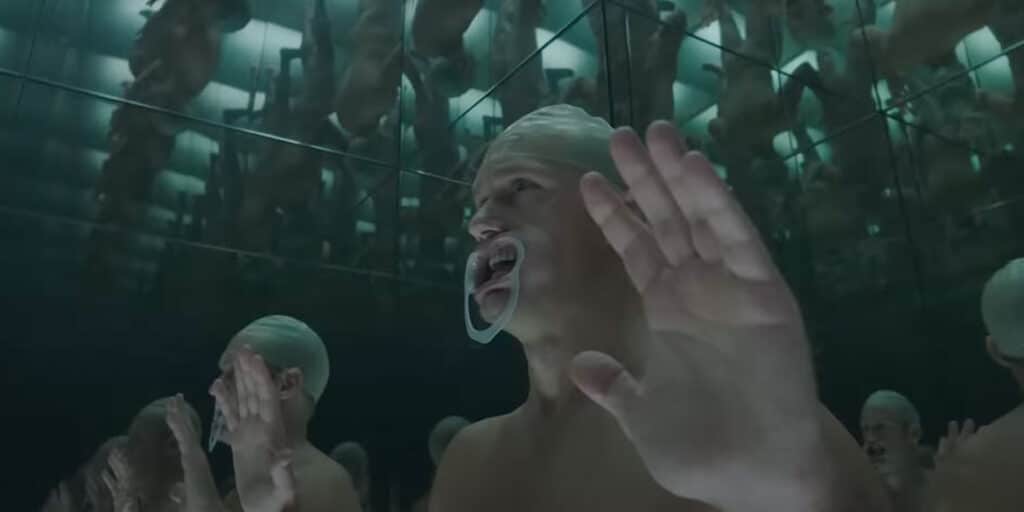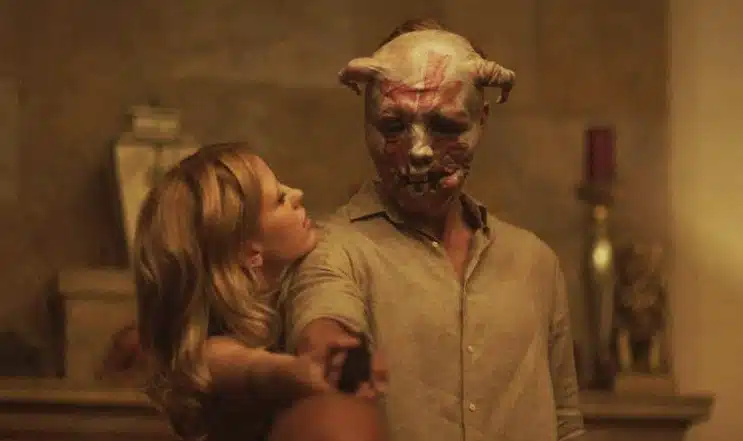
Brandon Cronenberg may not have the most extensive filmography on the block – as of yet – but, based on the films he has brought us so far, you could suggest that selfhood and the performance of self are important themes. Infinity Pool (2023) is certainly no exception, but as Cronenberg continues to grow his own style and approaches, adding in bigger and bigger worlds for his alienated protagonists to play around in, a few issues or kinks – make of that term what you will – have perhaps crept in. But, despite a few minor glitches, it’s nonetheless a visually arresting film, with some punishing, magnetic performances and plenty to puzzle over. Whatever you may think or feel about his work, you can’t deny that it always leaves some sort of indelible mark, and Infinity Pool is no exception.
We move from bold colour, blaring opening credits (paging Gaspar Noé) into full blackout; a young couple in bed, which turns out to be Em (Cleopatra Coleman) and husband James (Alexander Skarsgård), pondering some cryptic phrase just spoken by James, though Em debates whether he was asleep or awake – it gets harder for her to tell, it seems. James also appears disenchanted, asking ‘Where am I?’ It turns out they’re in an exclusive resort, located somewhere called La Tolqa – a fictional somewhere and nowhere, albeit a place with its own alphabet and a curious, complex legal and jurisdictive culture (more anon). The way in which the opening camera shots wheel upside down, spinning and taking us queasily with them (page him again) makes the point that this place is detached from reality, and so are its inmates. It’s the end of the tourist season: only a few wealthy, nothing-to-do couples remain. James, a failing author, is reinvigorated briefly when he encounters a fan of his first, and so far only, book: the woman, Gabi (Mia Goth running at 100% Mia Goth) invites James and Em to dine with her and husband Alban (Jalil Lespert) that evening. James’ vanity holds sway: he agrees.
They do say that you should write about what you know: I’m talking about Cronenberg here. It turns out that this is a very artsy crowd, albeit with some issues. Gabi is an actor, Alban a former architect, James an author and Em springs from a moneyed publishing house (hence, she jokes, her father’s aversion to writers and by extension, to James). But all of these people are in some kind of stasis – they’ve moved on, or failed to move on, or they have found a way to make an artform of failure. Exasperatingly, they’re all still at this no doubt exclusive resort, finding ways to afford it; could there, possibly, be some needle here from the director towards the kinds of inert, inexplicably wealthy people he may have encountered? In any case, the dinner passes with only momentary discomforts, and the Fosters agree to leave the resort on the following day – an ill-advised action – for an excursion with Gabi and Alban. The barely-there flirtation between Gabi and James turns into something very much there during their time at the beach, but that’s not the key issue at this particular time.
On the way home, with James offering to drive, he accidentally hits and kills a pedestrian. A moment of panic ensues, but Gabi is adamant that they mustn’t call it in. La Tolqa, she points out, is an authoritarian state, and we’ve already seen that the locals have a clear aversion to tourists. Reluctantly, they try to re-enter the resort after their hit and run, but it turns out to be a pointless attempt to escape the consequences; early the next morning, police arrive, taking James and Em to the local station and charging James with manslaughter. Lots of crimes attract the death penalty in La Tolqa, and this is one of them. Gabi, Alban and Em, too, have already pointed the finger of blame at James. The die is cast.
Except…La Tolqa has a different means of ensuring justice is meted out, but that one of its wealthy visitors is not killed in the process. James has the option, for a fee of course, to be copied – his double, who will be fully culpable because he will have all of the same memories, will be killed by the family of the victim in his place. Part of the ritual insists that he has to bear witness to the execution – after which point, everything is sorted. James can go back to his own life, debt to society paid.
Now, for many directors, probably for most directors, this plot development would likely be the high point of the narrative, a grand culmination of the bubbling absurdity and unease which have already been established. For Brandon Cronenberg, it is instead a kind of interesting bump in the road, a means of establishing that the wealthy of this place can buy themselves out of any situation, regardless of the deed. All that is important is that justice is seen to be done, even if the mile-high loophole La Tolqa has in place is really only available to people of means. People like James for instance, although like many writers he is diligent about spending other people’s money, so that he can purchase his ‘research time’ by proxy. And, after witnessing ‘his’ execution, it seems that James has entered a closed community of seasoned holiday-goers who have themselves undergone this same process for their own misdemeanours in the past, developing a kind of devil-may-care attitude like no other now that they have seen themselves, effectively, die. This includes Gabi and Alban, but James is not an easy fit for their group, and we begin to focus closely on his burgeoning crisis of identity.
From all its charming, bizarre little touches – which start early, with its mawkish masks, the same waiter appearing in different restaurants, the invented setting altogether – Infinity Pool still feels like it has the most recognisable, even workaday beginning of any of Cronenberg’s films so far. You’re jerked out of normality very hard and very early in Antiviral (2012) and particularly in Possessor (2020), but a dreamy holiday resort, a strange couple? It feels, at least at first, more normal – a term to use under advisement here. But the film tightens its grip steadily, expanding its vision as it does: this fictional country has its own forms of policing, law and justice which soon collide with the type of body horror Cronenberg Jr favours. It tantalises interesting technology and indulges in a few neon-trippy scenes as the copying process takes place – putting Skarsgård through the wringer as it goes – but really, it uses this motif to get at its big questions about values and morals, and then moves on to look at wealth and the inexplicably wealthy, monsters with no fear of death for their deeds. It’s good, by the by, to see the doppelganger making such an engaging return to the horror/sci-fi genres here. It’s developed engagingly, too, becoming a scapegoat as much as a conventional, accusatory symbol of failure and wrongdoing.
If the film has one key issue, it’s perhaps in how it groans under the weight of all this subtext, some of which feels a little overfamiliar in places, for all the neat developments and stylistic tics along the way. It’s not fair to suggest that Infinity Pool was made to be analysed rather than enjoyed – despite the current ‘fan gap’ between critics’ reviews and audience reviews on Rotten Tomatoes – but it repetitively leans on its eat the rich vibes in places, across two hours mind you, sometimes with some clunky dialogue which loses the slick humour of a close parallel such as (and I’m ready to argue this) Society (1989). There is doubtlessly some humour to be found in here though – James’s final straw being made to hear a bad review of his book, for instance! – and the cast is great, with Mia Goth in particular revealing why she is something of a genre cinema darling these days. All in all, this is still a lush, queasy, interesting film, despite not being an unequivocal triumph like the extraordinary Possessor.
